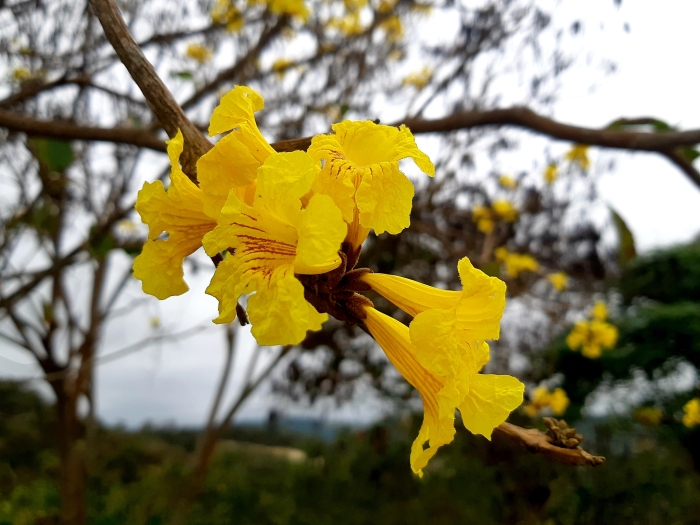Golden Trumpet Tree
(Handroanthus chrysanthus)
Golden Trumpet Tree (Handroanthus chrysanthus)
/
/

Daniel Velasco C.
CC BY 4.0
Image By:
Daniel Velasco C.
Recorded By:
Copyright:
CC BY 4.0
Copyright Notice:
Photo by: Daniel Velasco C. | License Type: CC BY 4.0 | License URL: http://creativecommons.org/licenses/by/4.0/ | Rights Holder: Daniel Velasco C. | Publisher: iNaturalist | Date Created: 2020-07-27T15:08:21-07:00 |





























Estimated Native Range
Summary
Handroanthus chrysanthus, commonly known as Golden Trumpet Tree, is a semi-deciduous tree native to the tropical dry forests, savannas, and riparian zones of Central and South America and Mexico. It can grow to a height of 25-50 feet and a similar width, with a rounded canopy that offers dappled shade. The tree is renowned for its showy, bright yellow flowers that bloom in the spring, typically from February to April, coinciding with the dry season to ensure seed dispersal with the onset of early rains. If the rainy season is delayed, the Golden Trumpet Tree may experience a second, though less vigorous, flowering and fruiting period. This species exhibits an efficient moisture management strategy similar to that of mango trees, with its most water-intensive biological functions occurring during the dry season.
The Golden Trumpet Tree is valued for its striking floral display and its ability to adapt to varying moisture conditions, making it a popular choice for ornamental planting in urban landscapes, parks, and gardens. It thrives in full sun to part shade and requires medium to high amounts of water, preferring soils with medium to fast drainage. While it is a beautiful addition to any garden, it can be susceptible to pests such as aphids and fungal diseases like powdery mildew. Gardeners should be aware of its potential to become invasive in non-native areas, as it can outcompete local flora.CC BY-SA 4.0
The Golden Trumpet Tree is valued for its striking floral display and its ability to adapt to varying moisture conditions, making it a popular choice for ornamental planting in urban landscapes, parks, and gardens. It thrives in full sun to part shade and requires medium to high amounts of water, preferring soils with medium to fast drainage. While it is a beautiful addition to any garden, it can be susceptible to pests such as aphids and fungal diseases like powdery mildew. Gardeners should be aware of its potential to become invasive in non-native areas, as it can outcompete local flora.CC BY-SA 4.0
Plant Description
- Plant Type: Tree
- Height: 25-50 feet
- Width: 25-50 feet
- Growth Rate: Moderate
- Flower Color: Yellow
- Flowering Season: Spring
- Leaf Retention: Semi-Deciduous
Growth Requirements
- Sun: Full Sun, Part Shade
- Water: Medium, High
- Drainage: Medium, Fast
Common Uses
Bee Garden, Bird Garden, Butterfly Garden, Hummingbird Garden, Low Maintenance, Showy Flowers
Natural Habitat
native to the tropical dry forests, savannas, and riparian zones of Central and South America and Mexico
Other Names
Common Names: Araguaney, Roble Amarillo, Yellow Ipê
Scientific Names: , Handroanthus chrysanthus, Tecoma chrysantha subsp. meridionalis, Tecoma chysantha, Tecoma spectabilis,
GBIF Accepted Name: Handroanthus chrysanthus (Jacq.) S.O.Grose